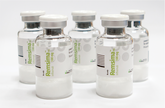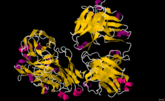Biosimilars/Research
EMA guidance for NBCDs and products approved
The European Medicines Agency (EMA) has published reflection papers on nanomedicines and their follow-on versions [1]. It has also published a wide range of other guidance, which outlines the technical requirements to demonstrate the quality, safety and efficacy of medicines that may also be applicable to non-biological complex drugs (NBCDs), according to authors Ehmann and Pita [2].
Danish infliximab switching study shows no difference
A study published by researchers from Denmark has found that switching from originator to biosimilar infliximab has ‘no negative impact on disease activity’ [1].
Post-marketing experience with IBD biosimilars
The introduction of anti-tumour necrosis factor-alpha (TNF-α) monoclonal antibodies (mAbs), about two decades ago, has revolutionized the management of inflammatory bowel disease (IBD). However, they are also expensive and their cost can lead to restricted access for many patients.
Accountability, safety and competition in biologicals markets
Regulatory systems for drug approval aim to reduce the likelihood of drug-related safety problems, but cannot fully eliminate post-marketing safety events. Such safety problems can have substantial consequences for patient’s well-being. For example, the most severe class of recalls issued by the US Food and Drug Administration (FDA) occur about once per month, and have recently been increasing in frequency [1]. Post-marketing surveillance or pharmacovigilance systems enable monitoring of and response to safety problems that may be undetected before drugs reach the general market [2]. When a safety problem occurs, successful identification of the responsible firm, or accountability, depends on the information available to the pharmacovigilance effort [3, 4].
Computer modelling for glycoengineering of biosimilars
In order to be approved by regulatory agencies, biosimilars are required to match all pharmacological properties of the originator protein drug to guarantee efficacy and alleviate safety concerns.
Prospective study finds switching to biosimilar infliximab safe
A study of the infliximab biosimilar Remsima has, according to the authors, shown similar ‘safety and survival’ of biosimilar infliximab Remsima compared to the originator biological Remicade [1].
Rituximab biosimilar safe in advanced follicular lymphoma patients
A study of the rituximab biosimilar CT‑P10 has, according to the authors, ‘demonstrated’ similar pharmacokinetics (PK) and safety when administered in combination with cyclophosphamide, vincristine and prednisone (CVP) in patients with newly diagnosed advanced follicular lymphoma (AFL) [1].
Harmonization of requirements for NBCDs across regions
Efforts are being undertaken to continuously develop and harmonize the regulatory requirements for complex medicinal products across regions. Taking this into account, authors Ehmann and Pita believe the European Union (EU) network is ready for non-biological complex drugs (NBCDs) [1].
US pharmacists’ views on the naming and labelling of biologicals
The Alliance for Safe Biologic Medicines (ASBM) has published the results of a survey determining the opinions of US pharmacists about the naming and labelling of biosimilars [1].
Italian study compares epoetin biosimilars and originator biologicals
Recently, extensive discussion on the opportunity offered by biosimilars for the sustainability of the National Health Services has taken place in academic and regulatory contexts. The use of biosimilars continues to be limited, and the scepticism of prescribers and patients seem to be linked to the uncertainty of the risk-benefit profile of biosimilars. In the case of epoetins, used in the management of anaemia in the nephrology and oncology settings, the results of a recent study showed no difference between biosimilars and originators on relevant effectiveness and safety outcomes [1].













